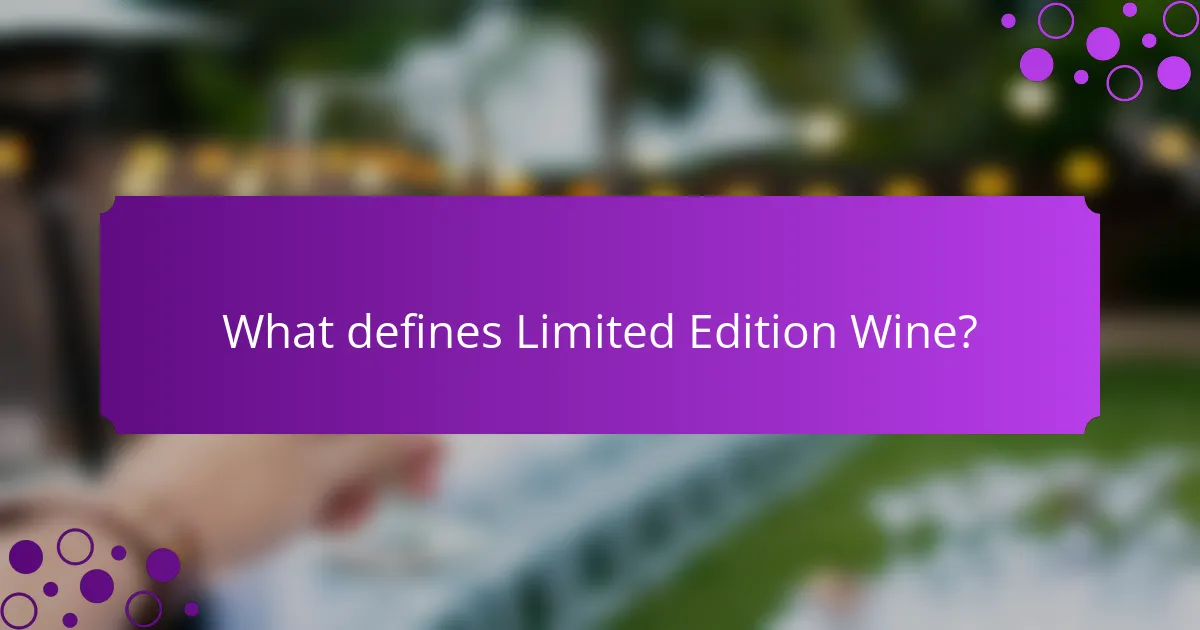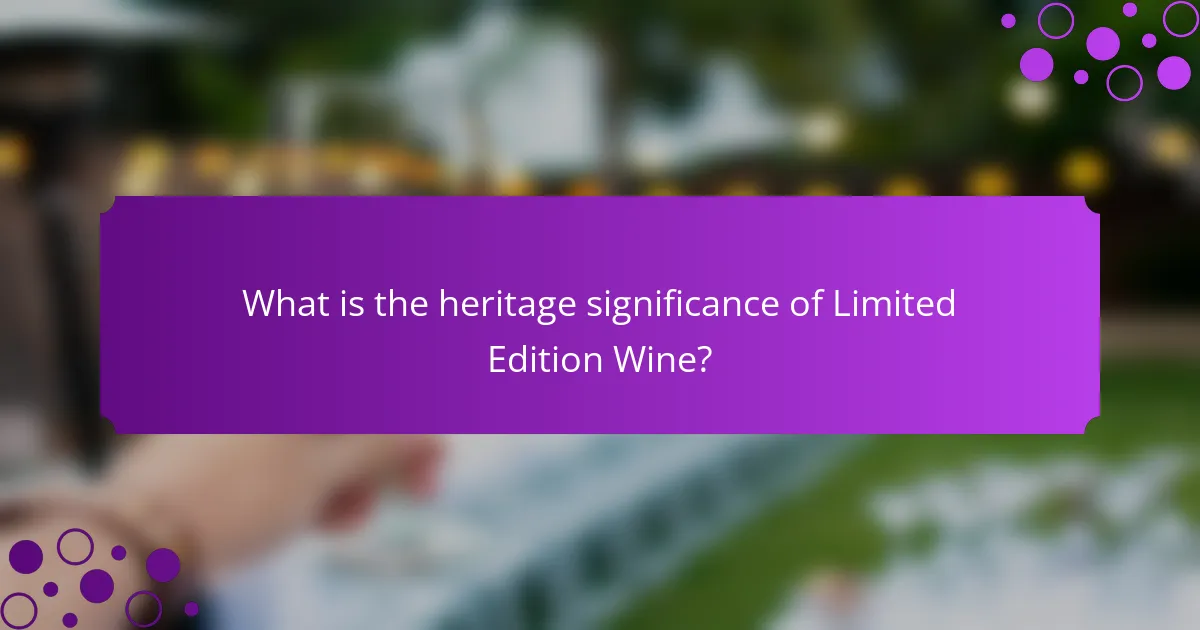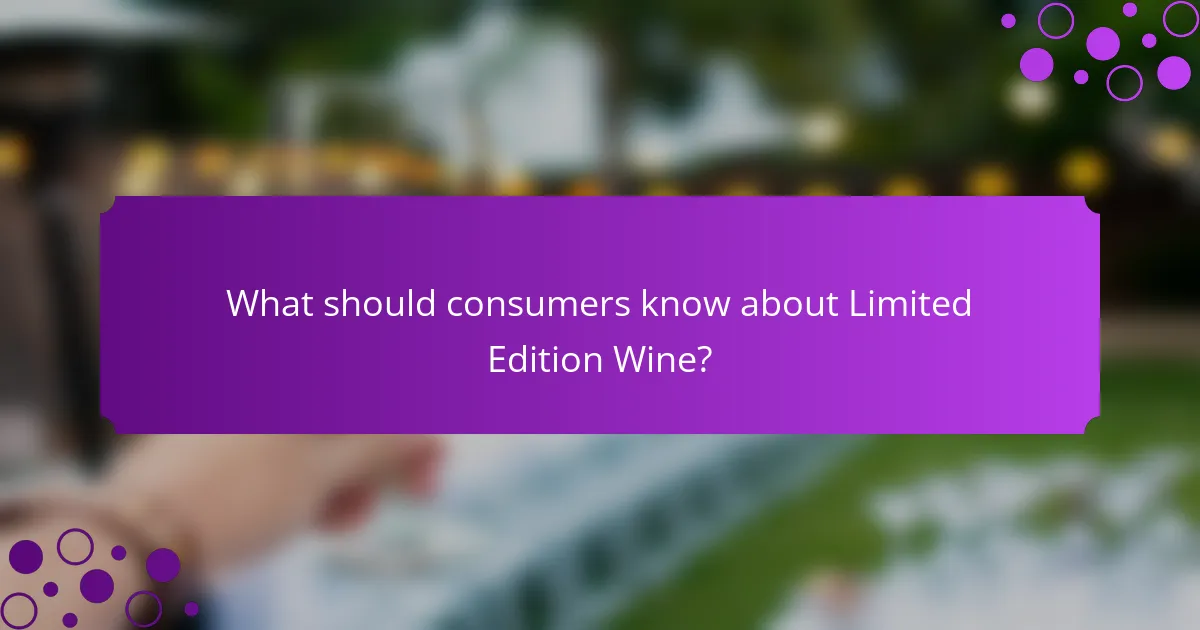
What defines Limited Edition Wine?
Limited Edition Wine is defined as a wine produced in a restricted quantity, often to commemorate a specific event or vintage. These wines are typically crafted with unique characteristics that highlight particular regional traits. Limited Edition Wines are often released with special labeling and packaging. They may feature exclusive grape varieties or blends not commonly available. The production volume is intentionally kept low to enhance exclusivity. This practice creates a sense of rarity and desirability among collectors and enthusiasts. Limited Edition Wines often come with a narrative that connects them to heritage or tradition. This storytelling adds emotional value and enhances the wine’s appeal.
How is Limited Edition Wine distinguished from regular wine?
Limited Edition Wine is distinguished from regular wine by its exclusivity and production limitations. Limited Edition Wines are often produced in small quantities, making them rare. This rarity increases their perceived value among collectors and enthusiasts. Regular wines typically have broader production runs and are more widely available. Limited Edition Wines often feature unique attributes, such as special varietals or specific vineyard selections. They may also come with distinctive packaging or labeling that highlights their exclusivity. Additionally, these wines often reflect particular regional characteristics or heritage significance, enhancing their uniqueness.
What are the unique attributes of Limited Edition Wine?
Limited Edition Wine is characterized by its exclusivity, distinctive flavors, and limited production. These wines often come from specific regions known for their unique terroir. The grapes used are usually of superior quality, selected for their exceptional characteristics. Limited Edition Wines may feature unique packaging or labeling that signifies their special status. They often have a higher price point due to their rarity and craftsmanship. Additionally, these wines may be produced in small batches, enhancing their uniqueness. The aging process can also vary, contributing to distinct flavor profiles. Collectors and connoisseurs often seek out Limited Edition Wines for their investment potential and prestige.
What factors contribute to the exclusivity of Limited Edition Wine?
Limited Edition Wine is exclusive due to factors such as limited production, unique terroir, and historical significance. Limited production restricts availability, making these wines rare. Unique terroir refers to the specific environmental conditions that influence the wine’s flavor profile. Historical significance adds value, as certain wines are tied to important events or traditions. Additionally, the involvement of renowned winemakers can enhance exclusivity. Collectors often seek these wines due to their perceived investment potential. Market demand also plays a crucial role, as high demand can drive prices up significantly.
Why is the regional characteristic important in Limited Edition Wine?
Regional characteristics are crucial in Limited Edition Wine because they influence the wine’s flavor profile and quality. The terroir, which includes soil type, climate, and topography, directly impacts grape cultivation. Unique regional attributes create distinct taste experiences that appeal to collectors. Limited Edition Wines often showcase these characteristics, emphasizing their exclusivity. For example, wines from Bordeaux are known for their complexity due to the region’s specific climate and soil conditions. This connection to place enhances the wine’s narrative and market value. Furthermore, consumers often seek wines that reflect their heritage or the identity of a particular region, making these characteristics highly desirable.
How do different regions influence the taste of Limited Edition Wine?
Different regions significantly influence the taste of Limited Edition Wine. Terroir, which includes soil, climate, and topography, shapes the flavor profile. For instance, wines from Bordeaux exhibit rich fruit flavors due to its clay and limestone soils. In contrast, Napa Valley wines often showcase bold, ripe characteristics from its warm climate. The unique grape varieties cultivated in each region also contribute distinct tastes. For example, Pinot Noir from Burgundy is known for its elegance and complexity, while Zinfandel from California is fruit-forward and spicy. Historical winemaking practices in each area further enhance regional flavors. This interplay of factors creates a diverse spectrum of tastes in Limited Edition Wines.
What are the notable regional varieties of Limited Edition Wine?
Notable regional varieties of Limited Edition Wine include Bordeaux from France, Barolo from Italy, and Napa Valley Cabernet Sauvignon from the United States. Bordeaux wines are renowned for their blend of Cabernet Sauvignon, Merlot, and Cabernet Franc. Barolo is celebrated for its Nebbiolo grape, producing complex and age-worthy wines. Napa Valley Cabernet Sauvignon is known for its bold flavors and rich tannins. Each of these regions has unique terroirs that contribute to the distinct characteristics of their wines. Bordeaux’s maritime climate influences its fruitiness. Barolo’s hilly terrain enhances its acidity and tannin structure. Napa Valley benefits from warm days and cool nights, promoting balanced ripeness. These factors solidify their reputations as exceptional limited edition wines.

What is the heritage significance of Limited Edition Wine?
Limited Edition Wine holds significant heritage value as it often reflects the unique traditions and practices of a specific region. Each limited edition release typically showcases the distinctive terroir, capturing the essence of the local environment. This wine often celebrates historical winemaking techniques passed down through generations. For instance, certain vineyards may employ ancient methods that enhance the cultural narrative of the wine. Additionally, limited editions can commemorate significant events or milestones in a region’s viticultural history. This connection to heritage fosters a sense of identity among local communities and wine enthusiasts. Collectors often view these wines as tangible representations of cultural legacy. The rarity of limited editions also elevates their status, making them important artifacts in the study of regional wine heritage.
How does heritage impact the production of Limited Edition Wine?
Heritage significantly impacts the production of Limited Edition Wine by influencing the grape varieties used and the winemaking techniques employed. Specific regions often have historical ties to particular grape types that thrive in their climate and soil. For example, Bordeaux is renowned for Cabernet Sauvignon and Merlot, which are deeply rooted in its winemaking history. Traditional methods, such as oak aging and specific fermentation processes, are often passed down through generations. These techniques contribute to the unique flavor profiles of wines from these regions. Additionally, heritage can dictate vineyard practices, such as organic farming or biodynamic methods, which enhance the wine’s quality. The cultural significance of winemaking traditions also attracts consumers interested in authentic experiences. Overall, heritage shapes both the identity and quality of Limited Edition Wines.
What traditional methods are used in the creation of Limited Edition Wine?
Traditional methods used in the creation of Limited Edition Wine include hand harvesting, fermentation in small batches, and aging in oak barrels. Hand harvesting ensures only the best grapes are selected. Fermentation in small batches allows for greater control over flavor development. Aging in oak barrels enhances complexity and imparts unique flavors. These methods are rooted in centuries-old winemaking practices. They contribute to the distinct character of Limited Edition Wines. Each method reflects the regional heritage and winemaking traditions. These practices are often passed down through generations, preserving local culture.
How do historical events shape the identity of Limited Edition Wine?
Historical events significantly shape the identity of Limited Edition Wine. These wines often commemorate specific moments, such as anniversaries or significant harvests. For instance, wines produced to mark a historical event, like a royal wedding, gain unique cultural significance. The region’s history influences grape selection and winemaking techniques. Historical regulations, such as those from the Appellation d’Origine Contrôlée in France, dictate production methods and quality standards. Limited Edition Wines often reflect traditional practices that have been passed down through generations. They can also embody the resilience of a region after events like natural disasters or economic challenges, showcasing recovery and heritage. The narrative behind each bottle adds to its exclusivity and allure, making it a collector’s item.
What role does storytelling play in Limited Edition Wine marketing?
Storytelling plays a crucial role in Limited Edition Wine marketing. It creates an emotional connection between the consumer and the product. This connection enhances the perceived value of the wine. Engaging narratives often highlight the wine’s origin and craftsmanship. They can include details about the vineyard, winemaker, or unique production methods. These stories foster a sense of authenticity and heritage. Research indicates that consumers are more likely to purchase products with compelling stories. A study by the Journal of Consumer Research shows that storytelling can increase willingness to pay by up to 20%. Thus, storytelling is essential for differentiating Limited Edition Wines in a competitive market.
How do producers communicate the heritage of their Limited Edition Wine?
Producers communicate the heritage of their Limited Edition Wine through storytelling and labeling. They often highlight regional history, grape variety, and traditional winemaking techniques. This information is conveyed on the wine label and promotional materials. Many producers include details about the vineyard’s location and climate. They may also share personal anecdotes or family traditions associated with the wine. Additionally, producers often engage in tastings and events to share their heritage. These experiences allow consumers to connect with the wine’s background. This approach helps to create a sense of authenticity and exclusivity.
What are examples of successful storytelling in Limited Edition Wine branding?
Successful storytelling in Limited Edition Wine branding includes narratives that connect the wine to its heritage and regional characteristics. For example, Château Mouton Rothschild uses unique labels designed by renowned artists. Each label tells a story related to the vintage or historical event. Another example is Opus One, which emphasizes the collaboration between French and American winemaking traditions. Their branding highlights the fusion of cultures and craftsmanship. Additionally, Penfolds Grange incorporates stories of pioneering winemakers and the evolution of their techniques. This storytelling approach enhances the perceived value of the wine. It creates an emotional connection with consumers, making the limited editions more desirable.

What should consumers know about Limited Edition Wine?
Limited edition wine refers to wines produced in restricted quantities, often highlighting unique characteristics. Consumers should know that these wines may showcase specific regional traits and heritage significance. The limited production often results in higher quality and distinct flavors. Additionally, limited edition wines can appreciate in value over time due to their scarcity. They are often released to celebrate special occasions or milestones within a winery. Consumers should also be aware that these wines may have unique labeling and packaging, enhancing their collectibility. Limited edition wines can provide a unique tasting experience that reflects the terroir of the region.
How can consumers identify quality Limited Edition Wine?
Consumers can identify quality Limited Edition Wine by examining several key factors. First, look for specific vineyard information and vintage details on the label. Quality wines often come from renowned regions known for their terroir. Additionally, check for limited production numbers, as this signifies exclusivity and careful crafting.
The presence of awards or ratings from reputable wine critics can also indicate quality. Furthermore, consider the winemaking techniques used, such as organic or biodynamic practices, which often enhance the wine’s character.
Lastly, research the winery’s reputation and history. Established wineries with a strong heritage typically produce higher quality wines. These elements combined can help consumers discern quality in Limited Edition Wine.
What attributes should consumers look for when purchasing Limited Edition Wine?
Consumers should look for the vintage year when purchasing Limited Edition Wine. The vintage indicates the year the grapes were harvested. A good vintage can signify quality due to favorable weather conditions.
Next, consumers should consider the region of production. Certain regions are known for specific grape varieties and styles. For example, Bordeaux is renowned for its red blends.
Another important attribute is the winery’s reputation. Established wineries often have a history of producing high-quality wines. This can be a strong indicator of the wine’s potential value.
Lastly, consumers should examine the bottle’s packaging and labeling. Limited edition wines often feature unique designs or special labels. This can enhance the wine’s collectability and aesthetic appeal.
How does provenance affect the value of Limited Edition Wine?
Provenance significantly affects the value of Limited Edition Wine. It refers to the origin and history of the wine, including the vineyard, production methods, and aging conditions. Wines with a well-documented provenance often command higher prices. This is because buyers associate quality and exclusivity with recognized regions and producers. For example, wines from renowned regions like Bordeaux or Napa Valley are often more valuable due to their established reputations. Additionally, limited editions with unique stories or historical significance can further enhance perceived value. Provenance can also impact collectability, as connoisseurs seek wines with a traceable history. Thus, provenance plays a crucial role in determining the market value of Limited Edition Wine.
What tips can enhance the enjoyment of Limited Edition Wine?
To enhance the enjoyment of Limited Edition Wine, focus on proper serving temperature. Serving red wine slightly below room temperature and white wine chilled maximizes flavor. Use appropriate glassware to allow the wine to breathe. Swirling the wine releases its aromas, enhancing the tasting experience. Pair the wine with complementary foods to elevate its flavors. Consider the wine’s unique characteristics, such as regional notes and heritage significance, when tasting. Take time to savor each sip, allowing the full profile to develop on the palate. Lastly, share the experience with knowledgeable friends to enrich the discussion and enjoyment.
How should Limited Edition Wine be stored for optimal taste?
Limited Edition Wine should be stored in a cool, dark place. Ideal storage temperature is between 50°F to 55°F. Humidity levels should be around 60% to 70%. Bottles should be laid horizontally to keep the cork moist. Light exposure should be minimized to prevent degradation. Vibration should be avoided as it can disturb the sediment. These conditions help maintain the wine’s flavor and aroma. Studies show proper storage significantly enhances wine longevity and quality.
What are the best practices for serving Limited Edition Wine?
Serve Limited Edition Wine at the optimal temperature for its type. Red wines are best served between 60-65°F, while white wines should be between 45-55°F. Use proper glassware to enhance the wine’s characteristics. For red wines, use larger glasses to allow for aeration. For whites, use narrower glasses to preserve their crispness.
Decanting can improve the flavor profile of some Limited Edition Wines. This process allows the wine to breathe and can enhance its aromas. Pour gently to avoid disturbing any sediment that may be present.
Limit the exposure to light and temperature fluctuations. Store Limited Edition Wines in a dark, climate-controlled environment. This preserves the integrity of the wine over time.
Serve Limited Edition Wines in smaller quantities. This allows guests to savor the unique flavors without overwhelming their palate. Lastly, provide tasting notes or background information about the wine. This adds context and enhances the tasting experience.
Limited Edition Wine is a unique category of wine produced in restricted quantities, often highlighting specific regional characteristics and heritage significance. This article explores the defining attributes of Limited Edition Wine, including its exclusivity, distinctive flavors, and the factors contributing to its desirability among collectors. It examines the influence of terroir on taste, the role of traditional winemaking methods, and the importance of storytelling in marketing these wines. Additionally, the article discusses how provenance affects value and offers tips for consumers on identifying quality Limited Edition Wines and enhancing their enjoyment.